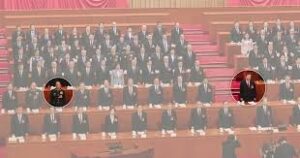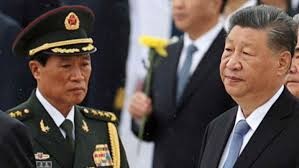In an unprecedented move that sent shockwaves and palpable embarrassment through China’s political and military establishment, the Chinese Communist Party (CCP) purged nine leading generals from the People’s Liberation Army (PLA) and the Coast Guard. The sweeping removal, which occurred just days before a crucial Party plenum, was announced on October 17, 2025, amidst an intensified anti-corruption campaign, perceived failures in the South China Sea strategy, and ineffective posturing toward Taiwan.
The announcement, delivered by the Ministry of Defense and reported by outlets such as Reuters and the BBC, marked one of the most significant public shake-ups within the PLA in recent history. The purge came on the eve of the Fourth Plenum of the Communist Party, a critical Central Committee meeting scheduled to commence on October 20.

The Downfall of a Xi Jinping Ally
The most prominent official dismissed was General He Weidong, Vice Chairman of the Central Military Commission (CMC). Until recently, He Weidong was widely considered a close political ally of President Xi Jinping and the second most powerful figure in China’s armed forces.
The removal of He Weidong is particularly significant for several reasons:
Politburo Membership: He Weidong was an incumbent member of the Politburo, making this the first such public dismissal since 2017.
Key Military Strategist: He played a critical role in strategic military planning and high-profile operations, including the aggressive live-fire exercises around Taiwan in August 2022.
Ties to Xi: His connection to President Xi dated back to their overlapping tenures in Fujian province, where Xi served as a high-ranking provincial official alongside He Weidong.
Alongside He Weidong, General Miao Hua, the former leading political officer of the PLA and also a CMC member until June 2025, was also purged by the Chinese government.
Corruption, Disciplinary Violations, and Operational Failures
The Ministry of Defense stated that the two senior officials, and the seven others dismissed, were found to have committed “serious violations of discipline and law.” The nature of these transgressions includes:
Corruption: The officials were accused of “serious crimes related to duty, involving huge amounts of money… with extremely serious and harmful consequences.” This reinforces the narrative of Xi Jinping’s continuing anti-corruption drive.
Operational Ineffectiveness: The dismissals also appear to be tied to alleged failures and embarrassment in China’s assertive campaigns, particularly in the South China Sea. This includes reported mismanagement or poor outcomes related to confrontations and collisions involving PLA Navy and Coast Guard vessels.
Taiwan Policy: Failures in military posturing and strategy to “deter and control” Taiwan were also reportedly factors in the shake-up.
The Ministry emphasized that these removals represent a major achievement in the Party’s campaign to improve operations in the South China Sea and Taiwan, while simultaneously cleaning up internal corruption within the Party and the military. The other dismissed officials were reported to be from the Coast Guard and military intelligence ranks, facing similar charges of corruption and operational inadequacy concerning the South China Sea, Taiwan, and military posturing against rivals like the United States and Australia.
The Timing: Consolidation of Power

The timing of this dramatic crackdown is impossible to ignore, coming on the eve of the Fourth Plenum. This critical meeting is where the Central Committee will discuss the next five-year plan for China’s economic development and often involves significant leadership adjustments.
Analysts cited by the BBC suggest the purges serve two calculated purposes:
-
Public Display of Resolve: They offer a highly public demonstration of Xi Jinping’s unwavering determination to eradicate corruption.
Consolidation of Power: They are a calculated move to cement loyalty and consolidate Xi’s power ahead of major personnel and policy decisions to ensure adherence to his strategic goals, including the progressive military and economic control over the South China Sea and a hardline approach toward Taiwan.
The disappearance of both He Weidong (since March 2025) and Miao Hua (since November of the previous year) from public events had previously fueled intense speculation about their fates—a pattern common in China where leaders sideline those who do not align with their agenda. The families of the accused have remained silent and elusive, adding to the shroud of secrecy typical of major political purges in the Communist nation.





